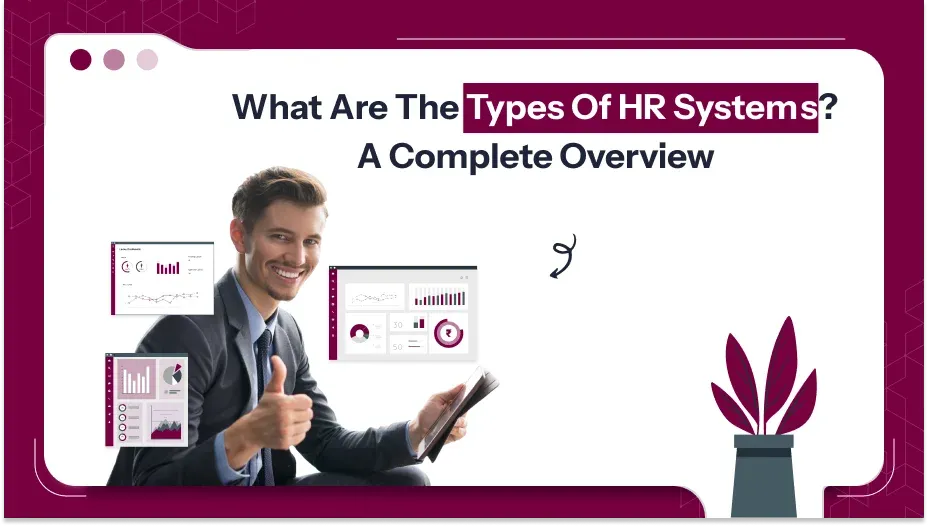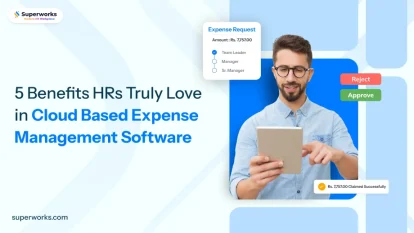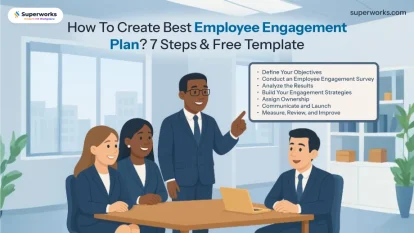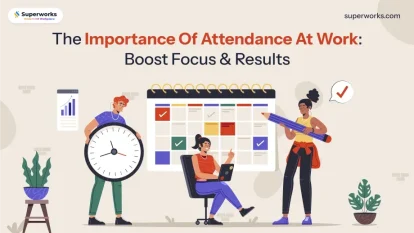Yes, HR systems like HRMS on the cloud and online HRMS tools are highly suitable for small businesses. They are cost-effective, and scalable, and help small businesses manage HR tasks efficiently.
Grab a chance to avail 6 Months of Performance Module for FREE
Book a free demo session & learn more about it!
-
Will customized solution for your needs
-
Empowering users with user-friendly features
-
Driving success across diverse industries, everywhere.
Grab a chance to avail 6 Months of Performance Module for FREE
Book a free demo session & learn more about it!
Superworks
Modern HR Workplace
Your Partner in the entire Employee Life Cycle
From recruitment to retirement manage every stage of employee lifecycle with ease.


Seamless onboarding & offboarding
Automated compliance & payroll
Track performance & engagement
What Are The Types Of HR Systems? A Complete Overview
- what is hr system
- 9 min read
- January 10, 2025

Well-structured human resources systems are an excellent way of increasing the performance efficiency of any kind of organization. As the business progresses, manual process-based HR departments become outdated and less helpful in improving production and management systems. That’s where the significance of different HR systems becomes operational, bringing systematic solutions for creating efficiency and performance in the accomplishment of businesses. In this article, we shall completely guide you through the types of HR systems, benefits, and practical tips for selecting the right HR system for your organization.
What Is an HR System?
An HR system is a technology-based platform for managing and automating various functions in the Human Resources department. Such functions may include payroll, recruitment, attendance, and performance management. All of these will help save time and reduce errors in such processes and, therefore, improve employee satisfaction.
Modern HR systems also offer analytics and reporting tools to drive better-informed decision-making within organizations. Whether a startup or an enterprise firm, appropriate types of HR systems can revolutionize the prospects of managing the workforce.
Key Benefits of HR Systems
Improved Efficiency
HR systems also automate tasks such as attendance records, payroll calculations, and compliance reports. This means that instead of conducting administrative work, HR teams can be doing more strategic activities.
Enhanced Decision-Making
With real-time data and analytics, HR systems enable businesses to spot trends, measure employee performances, and make fact-based decisions.
Employee Engagement
Self-service portal and mobile access facilitate ease of employee access to his records, leaf application, and feedback submission.
Compliance Management
HR systems feature tools for compliance purposes, labor laws, and regulations. This reduces legal risks and penalties for breaking the rules.
Types of HR Systems
With the dynamics in the business environment of today, managing activities related to the workforce is necessary and inevitable. HR systems help regulate these processes efficiently, making it possible for automation and streamlining of HR processes with error reduction and productivity. Different types of HR systems are available for various types of needs, and this list has an expanded description of the types of HR systems as well as examples of their uses.
Core HR Systems
Core HR systems represent the core backbone of HR operations. These will deal with payroll, benefits administration, and attendance management. They suit organizations looking for the automation of routine tasks to focus on compliance.
- Features: Payroll processing, leave management, and benefits administration.
- Best For: Organizations prioritizing basic HR tasks.
- Example: HRMS payroll software in india for payroll and compliance.
Talent Management Systems
Talent management systems for organizations help to attract, develop, and retain top-class talent. They make hiring easier and come along with tools for employee development and performance tracking.
- Features: Recruitment, onboarding, and training programs.
- Best For: Companies focused on employee development and retention.
- Example: Cloud HRMS solutions for talent management.
Human Resource Management Systems
HRMS is an integrated product that combines core HR functions with talent management and analytics. Such systems have been described to follow the entire life cycle of a human resource person from recruitment to retirement.
- Features: Payroll, attendance, compliance tools, and performance management.
- Best For: Medium to large enterprises.
- Example: HR software in india for integrated workforce solutions.
Human Capital Management Systems
HCM systems are strategic HR solutions aimed at maximizing workforce planning and employee engagement. The system primarily aligns HR goals with business objectives.
- Features: Workforce analytics, succession planning, and career development.
- Best For: Enterprises with a long-term strategic focus.
- Example: Advanced analytics platforms for workforce optimization.
You can choose from a type of HR systems to find the right fit for your business.
Simplify HR management and boost efficiency today!
Learning Management Systems
LMS platforms focus on the learning and development needs of employees. They provide tools to create, deliver, and track training programs, ensuring employees stay updated with necessary skills.
- Features: Training modules, skill assessments, and certification tracking.
- Best For: Companies prioritizing employee training and development.
- Example: Best human resource software tools for learning management.
Performance Management Systems
Performance management systems tailor tracking and performance enhancement of workers. These management tools help one set clear goals, give some form of feedback, and evaluate employee growth.
- Features: Goal setting, real-time feedback, and performance appraisals.
- Best For: Organizations looking to maximize productivity and personal accountability.
Specialized HR Systems
Specialized systems concentrate on the attendance tracking system or payroll management, even compliance reporting in some. So, the targeted organizations, whose needs aren’t full, opt for this tool.
- Features: Attendance tracking, tax compliance, and employee scheduling.
- Best For: Small businesses or companies with targeted HR needs.
- Example: HRMS for attendance and compliance.
Employee Engagement Platforms
These tools help enhance employee engagement and retention by enhancing communication and collaboration.
- Features: Feedback tools, recognition programs, and engagement surveys.
- Best For: Employers looking to motivate and motivate their employees.
- Example: Tools integrated with cloud HRMS solutions for real-time feedback.
Workforce Analytics Systems
Workforce analytics systems offer organizations a deeper insight into workforce trends. Using this information, they can make strategic decisions. The system analyzes data concerning turnover, performance, and employee satisfaction.
- Features: Predictive analytics, workforce planning, and trend analysis.
- Best For: Companies that prioritize strategic decision-making.
- Example: HRMS on a cloud with integrated analytics.
Compliance Management Systems
Compliance management systems are in place to guarantee labor laws compliance and regulatory compliance. The automation of reporting and minimizing risk is also offered through compliance management systems.
- Features: Automated compliance updates, documentation, and audit trails.
- Best For: Industries with stringent labor regulations.
How To Choose The Best HR Software Systems?
With all these types of HR systems, it’s the selection of the best HR system that may change your HR operations to make them efficient and more employee-friendly. First of all, figure out what you are looking for. So here is the step-by-step process on how to select the best one:
Identify Your Business Needs
Assess the challenges you are facing in HR now. Do you need to manage payroll, track attendance, or recruit employees? Small businesses would prefer HRMS, whereas large companies need to have cloud HRMS solutions to cater to a wide variety of functions.
Evaluate User-Friendliness
A complex system can discourage adoption. Types of HR systems with an intuitive interface to ensure that both HR teams and employees can use it effectively without extensive training.
Check Vendor Support and Reputation
Consistent customer support and frequent updates are crucial for ensuring seamless operations. Research the vendor’s reputation and check reviews from businesses similar to yours.
Focus on Scalability
Your business needs may grow over time, and your HR system should adapt accordingly. Look for scalable solutions like HRMS on cloud, which can easily expand to accommodate more employees and additional features as your organization grows.
Evaluate Cost and ROI
While cost is a significant factor, focus on the long-term value the HR system brings to your organization. A slightly higher initial investment can lead to significant savings in time and resources.
Consider Compliance Features
Ensure that the system you choose offers built-in compliance tools to meet local labor laws. Solutions like HRMS & payroll software in India are tailored to region-specific regulations and are ideal for Indian businesses.
Emerging Trends in HR Systems
HR systems are constantly evolving to keep up with the changing needs of modern workplaces. Staying updated on these trends helps organizations choose future-proof systems. Here are some key trends in types of HR systems:
Artificial Intelligence in HR
AI is transforming HR by automating resume screening, performance evaluation, and predictive analytics. AI-based HR data systems offer insights that help improve decision-making and employee retention.
Cloud-Based Solutions
Cloud technology is dominating HR systems, offering flexibility and remote access. Tools like cloud HRMS solutions enable HR teams to work efficiently, even in a hybrid or fully remote environment.
Mobile Accessibility
Employees want to access from anywhere and can check their payslips, request leaves, and provide feedback using their smartphones through mobile-friendly HR systems.
Integration with Employee Engagement Tools
Modern HR systems integrate with engagement platforms to gather real-time feedback, recognize achievements, and improve workplace morale.
Focus on Employee Experience
HRM systems are designed to improve the satisfaction of employees through self-service portals, dashboards, and wellness tools.
HR Systems Strategies
In other words, putting the right HR system in place requires more than just buying software. Businesses should instead have clear strategies to ensure a smooth transition and to maximize the benefit that their chosen types of HR systems can provide them.
Align HR Systems with Business Goals
Your HR system should serve your organization’s long-term objectives. For example, companies looking to focus on talent acquisition should instead prioritize services with rich recruitment and onboarding features.
Conduct a Needs Assessment
Analyze your HR processes before implementing a system to identify pain points and areas for improvement.
Provide Employee Training
Invest in training sessions to ensure that HR teams and employees are comfortable using the new system. The better they understand the tools, the more effective the system will be.
Monitor and Optimize Performance
After implementation, regularly evaluate the system’s performance. Use HR database systems to gather insights and make necessary adjustments to ensure the system meets your evolving needs.
Prioritize Security and Compliance
HR systems handle sensitive employee data, so security is a top priority. Ensure that your system includes data encryption and compliance tools to protect information and adhere to regulations.
Conclusion
The right types of HR systems can revolutionize your workforce management by automating tasks, improving employee engagement, and providing valuable insights. If you are looking for a core HR system talent management solution or even a full-fledged HRMS, it will need the perfect tool for achieving organizational objectives. Look into the following solutions cloud HRMS solutions or perhaps the best HRMS solutions for which one fits best with the business. It’s time we take the stride ahead in HR operations by initiating digital transformation at a higher scale.
FAQs
Are HR systems suitable for small businesses?
How do HR systems ensure compliance?
Types of HR systems include features that automate compliance tracking, update labor laws, and generate reports to ensure adherence to local regulations, such as HRMS payroll software in India for region-specific compliance.
Can human resource systems be integrated with other tools?
Yes, nowadays, the types of HR systems are all streamlined and align themselves automatically with the business tools of accountancy, performance management tools, and also all employee engagement platforms.
Can HR systems enhance employee engagement?
Features like self-service portals, real-time feedback tools, and recognition programs contribute to a more positive employee experience as well as higher engagement.
Are HR systems customizable?
Yes, many modern types of HR systems allow customization to meet specific business needs, such as payroll configurations or compliance updates for regional laws like HRMS payroll software in India.


